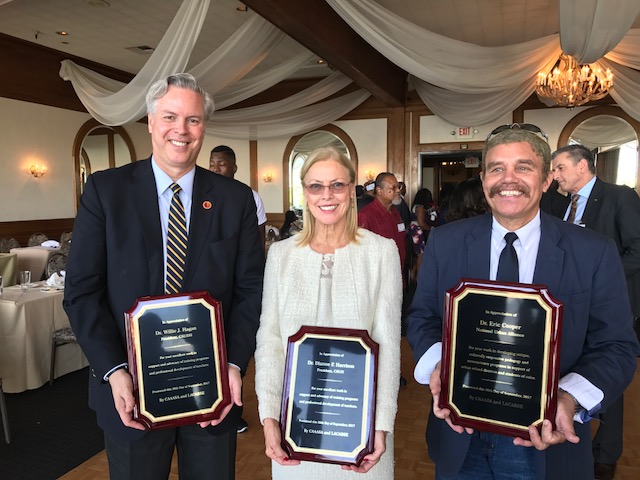CSUN President Harrison Receives Special Recognition by CAAASA for University’s Role in Advancing Educational Outcomes for Underrepresented Students
The California Association of African-American Superintendents and Administrators (CAAASA) recognized California State University, Northridge President Dianne F. Harrison at its Annual Round-Up of California Educational Organizations in Long Beach on Sept. 30 for “excellent work in support and advocacy of training programs and professional development of teachers.”
Harrison addressed those gathered for the event and openly thanked CAAASA for its work in championing the efforts of African-American students throughout the state.
“The challenges many students face are daunting, but we in education have the preparation and understanding to help elevate our students so that they can be personally and professionally fulfilled and engaged,” Harrison said. “I am honored to be with all the organizations here today that have had a part in advancing this goal that is so incredibly heartening and inspiring.”
In addition to Harrison, CAASA recognized National Urban Alliance (NUA) for Effective Education President Eric Cooper, Learning Policy Institute President Linda Darling-Hammond and California State University, Dominguez Hills President William Hagan. The efforts of Cooper and the NUA, with whom CSUN has partnered with in the past, are of particular importance to the overall national goal of diminishing the educational gap between white and African-American students by embracing race and culture for all students, including those in other underrepresented groups. The use of these teaching and learning approaches have proven successful in other cities across the country, and are making an impact in California.
CSUN has been a leader in ensuring that educators are prepared to help young people of all backgrounds thrive during their K-12 years so that they can be prepared to pursue higher education. Harrison noted the efforts of CSUN faculty, including their work with Project Grad, which develops curriculum change, mentoring and advisement opportunities, providing academic support to promote academic success for African-American and other students.
Harrison also pointed out the work on CSUN’s campus and its Matadors Rising campaign, which is promoting efforts to eliminate opportunity gaps and to help CSUN students reach graduation in a timely manner.
“In the classroom, to achieve our goal of greater equity in course outcomes for all students, we are committed to teaching and reaching all students of color with an eye toward eradicating existing opportunity gaps,” Harrison said. “I am pleased to continue our relationship and work toward deepening our partnership — with colleagues from our sister campus CSU Dominguez Hills, CAAASA and the Learning Policy Institute — to make an even bigger difference.”


 experience
experience